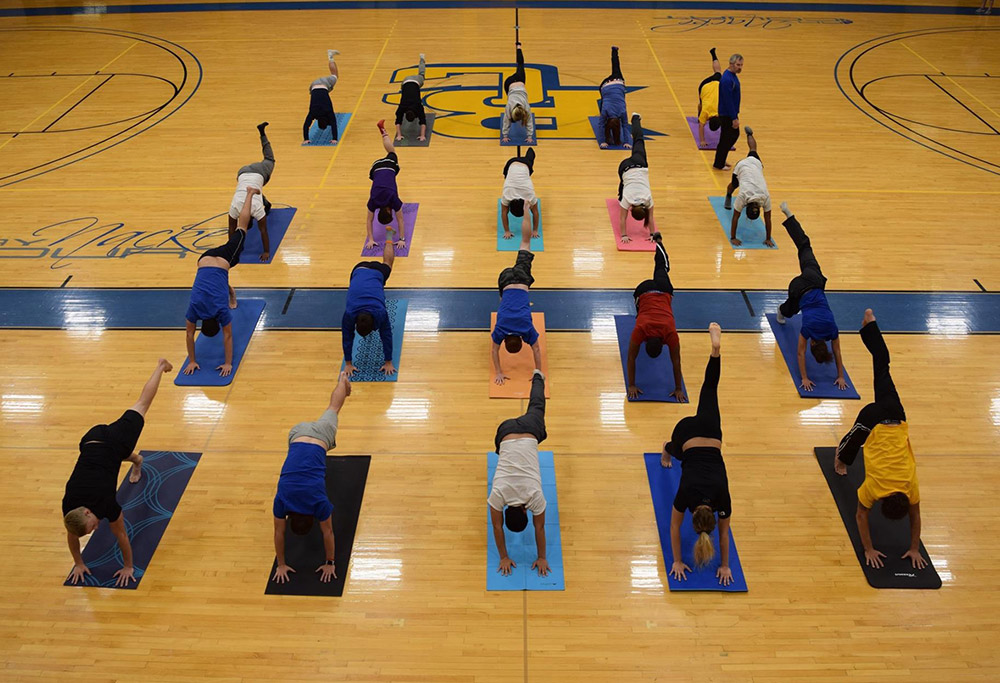Yoga Humanities
Key Topics
- 4 Bs of Kids Yoga
- History of Yoga
- 8 Limbs
- Mythology
- Storytelling & Sequencing
- Surya A Lab
- Right Relationships
- Ethics
- Social-Emotional Learning
- Surya B Lab
- Practicum
In this session, we’ll explore the origins of the yoga practice, its guiding principles and philosophy, and how its mythology and history is relevant for young people today. We’ll delve into our own creation myths, explore the inner resources that guide our mission and purpose, and practice helping young people discover the stories of the their lives and the voice and vision that shapes them.
The practice of yoga is an art and science dedicated to creating union between body, mind, and spirit. We’ll explore how this art and science can be practiced and lived beyond the yoga mat. We’ll examine some of the ethical dilemmas that teaching yoga and mindfulness to young people can produce and strategies for effectively navigating skeptical and/or critical audiences.
The majority of our time together will focus on the yamas and niyamas, ancient ethical precepts of universal morality and personal observance. We’ll practice cultivating the seeds of healthy, whole, wise living, both for ourselves and those we love and serve. We’ll explore the limiting beliefs and attitudes that keep us from reaching the potential of our true, authentic Self, and how through rigorous, yet compassionate inquiry, we can come to better understand our relationship to ourselves in order to better facilitate productive relationships with young people.
Activities will be a balance of discussion, lab, and creative reflection, and include asana and meditation practices and a practicum experience with a community partner.
CEUs
7 hours
Yoga Anatomy
Key Topics
- Biopsychosocial Living
- Anatomy & Physiology
- Asana Lab
The body is continuously sending us messages that the energy of our feelings, emotions, mind, and spirit, unfortunately, tune out. Our time together will focus on learning to tune into these messengers in order to transform our awareness of what’s happening in our own bodies so that we can better understand what’s happening physiologically in the lives of the young people we care for and serve. We’ll also examine the differences between functional and aesthetic yoga and how these differences inform how we model and teach young people.
The session includes an introduction to the foundations of asana and will contain several opportunities to explore physical practices to enhance mind, body, and spirit. Key module activities include an introduction to childhood development, an examination of skeletal variation, an asana lab and practices, and a discussion and practice of ways to incorporate functional anatomy into the parenting, teaching, counseling, and service to young people.
CEUs
7 hours
DEI & Trauma-Informed Care
Key Topics
- Inclusivity & Accessibility
- Yoga for EVERYbody
- Yoga for Special Needs
- Using Props
- Creating Safe Spaces
- Trauma-Informed Practices
- Mindful Resilience
- Yoga Nidra
- Practicum
94% of counseling center directors reported in a recent survey that the recent trend toward greater numbers of students with severe psychological problems continues to be true on their campuses. 26% of children in the U.S. witness or experience a traumatic event before they turn four years old. 11% of girls ages 14 to 17 reported experiencing sexual assault or abuse during the past year. 41% of youth under 18 reported experiencing a physical assault in the last year. 14% of children have experienced abuse by a caregiver (from the National Institute for Trauma and Loss in Children). Our children are crying out for help. Unfortunately, as parents and providers, caregivers and caretakers, we’re not always equipped to meet the needs of those we love, care for, and serve. The good news is we can change this sad reality. We can learn to be the rock our kids need us to be, the calm, steady nervous system for them to plug into, the role models for resiliency they need to not just survive, but thrive in this dynamic, ever-evolving landscape. The challenges young people face are profound. Our response needs to be even bigger.
Our time together in this session will focus on why things are the way they are, how we can become trauma-informed and create trauma-informed spaces, and strategies we can use for better self-care to avoid compassion fatigue and vicarious traumatization, as well mind-body skills for emotional regulation that we can utilize with young people.
Yoga is for EVERYbody. As parents and/or professionals, we have an obligation to strive for universal design. We know that communal spaces, whether in an organization, a school, or a home, benefit most when there is diversity, inclusion, and a sense of shared belonging. What we’ve learned from the individuals and families we’ve served over the years is that in one way, shape, or form, we all have needs and we all have abilities.
This session is all about creating a yoga and mindfulness practice that is accessible to all populations, no matter what the physical abilities. We will learn modifications and variations of common asanas (poses) through use of props, walls, chairs, or a bed. We will review common medical conditions and the benefits and concerns of integrating a yoga practice. We will discuss the impact of aging on the body generally, more specifically focusing on childhood development and fostering an awareness of different conditions that have precautions and contraindications for yoga poses and/or pranayama. We will discover the powers of our own body’s ability to heal ourselves-to strengthen, and to reduce stress and tension, and we’ll discuss the many therapeutic benefits of this practice for improving overall health and well-being. We will empower and offer resources to participants on how to offer a safe, therapeutic practice of yoga that builds an integrative community of individuals of all levels, abilities, and backgrounds.
Designed for anyone interested in finding a better way to serve those who need our help the most, and in rediscovering the passion and purpose that inspires us to love and care for our most vulnerable. Key session activities will consist of lecture and discussion, partner and group work with a presentation on modifications of asana and pranayama, and engagement with community partners.
CEUs
7 hours
Ayurveda & Energetic Life of Young People
Key Topics
- Ayurveda
- Gut-Brain Axis
- Koshas
- Brain Development
- Meditation
- Pranayama
- Chakras
- Mantras & Mudras
- Chanting
- Practicum
With the world (and our children) rushing hurriedly in so many different directions, we see kids who are overwhelmed with hyperactivity, aggression, TV and video-game addiction, moody behavior, stress, obesity, fatigue, the list goes on. These symptoms show are kids are not as healthy as they could be. As caregivers and providers, we can do something about this alarming, growing reality.
Often called or characterized as yoga’s “sister science,” Ayurveda is the world’s oldest wellness program. In this session, we’ll examine the medical and therapeutic roots of this ancient wisdom of life and practice, and explore meaningful ways to promote health and well-being rather than treating the symptomology of disease, both in ourselves and the young people we serve. We’ll examine mindful eating practices rooted in integrative health and how to incorporate them in the home or workplace. Some specific module activities include juicing and aromatherapy, as well as practices for promoting Ayurveda with children.
CEUs
7 hours
Building Communities with Kids
Key Topics
- Meditation
- Pranayama
- Chakras
- Mantras & Mudras
- Chanting
CEUs
7 hours
Yoga for Young Kids
Key Topics
- Infant-School Age Development
- Partner & Group: Poses & Games
- Practicum
This session will focus on the classifications of kid’s yoga from baby and toddler through preschool and elementary school-age. The Dalai Lama once said, “If every 8-year old in the world is taught meditation, we will eliminate violence from the world within one generation.” One doesn’t have to take this spiritual leader’s word for it, though. And we don’t have to wait until they’re eight. And we definitely can’t wait an entire generation. The time is now.
Experts in early childhood education, doctors, and mental health professionals have already begun to weigh in on the many benefits of a regular yoga and. mindfulness practice in young people. This session will focus on the research and evidence-based practices that guide our work with younger children.
Primary module topics include brain and social and emotional development, gross and fine motor development, games, problem-solving, team-building activities, and strategies for effectively planting the seeds of positive image, self-esteem, and self-expression. A practicum experience with community partners included as well.
CEUs
7 hours
Cultivating Courageous Kids
Key Topics
- Using Props
- Creating Safe Spaces
- Practicum
In this session, we’ll explore various strategies for building an integrative community of young people who practice and play and learn from one another. Building on Circle of Courage philosophy and practice, we’ll focus our attention on the games, activities, and experiences that cultivate a sense of personal belonging in communal spaces.
We’ll also examine some of the obstacles young people encounter in establishing and maintaining healthy relationships, both with their peers and with the adults who mentor, coach, teach, and counsel them. Our time together will be a combination of discussion, partner, small and large group games, and a practicum experience with community members.
CEUs
7 hours
Business & Ethics of Yoga
Key Topics
- Ethics for Yoga Teachers
- Asana Lab
- Practicum
Happy teachers can change the world. This session will focus on how to apply the knowledge of kids yoga and mindfulness to the marketplace. We’ll examine barriers and obstacles to entry, how to communicate value and benefit to employers and administrators, and various strategies to manage the backend logistics of your own kids’ yoga and mindfulness business.
Lab activities will include outlining an implementation plan and creating some of the initial marketing materials you will need to begin offering services.
CEUs
7 hours
Sadhana: Making a Mindful World
Key Topics
- Tween/Teen/Athlete Development
- 4Bs
- Asana Lab
- Practicum
CEUs
7 hours


